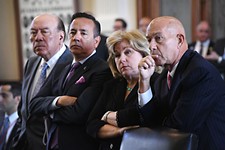On the Lege
Senate Untangles Tort-Reform Knot
Edited By Michael King, Fri., April 25, 2003

While the House was steamrolling its way through the budget debate last week, the Senate State Affairs Committee was plodding methodically, article by article and witness by witness, through HB 4, the "tort reform" bill that was passed by the House with so much angst several weeks ago. The Senate hearings themselves, under Sen. Bill Ratliff, R-Mount Pleasant, embody the difference between the two chambers of the 78th Legislature. The House Civil Practices Committee under Rep. Joe Nixon, R-Houston, skimmed through both HB 3 (medical malpractice) and HB 4 in a couple of days, and then the two bills were abruptly combined by fiat so that the new "HB 4" could be ramrodded through a full House that was already primed to approve med-mal reform. In the Senate, Ratliff and his colleagues have resisted the great rush, taking up each article in turn and alternating witnesses for and against. In Nixon's and other House committees, opponents of bills like HB 4, endorsed by the House GOP leadership, have often found themselves relegated to late-hour time slots and pro forma testimony.
Much of the headline controversy over HB 4 has concerned its proposed hard caps on noneconomic damages and the penalties it prescribes for plaintiffs who refuse settlement offers -- while corporate defendants face no such sanctions. Much of last week's Senate committee testimony, however, concerned other aspects of the bill: its potential undermining of product-liability law and its attempt to insert state and federal agencies between citizen plaintiffs and the courthouse.
One of the bill's provisions, for example, would shield manufacturers from liability if their products met applicable state and federal standards, unless a plaintiff could show that the standards themselves were completely inadequate. Another would direct that class-action lawsuits could not be tried if a Texas regulatory agency had jurisdiction over the matter, at least until the agency investigated and ruled on the complaint.
Among those who testified against those provisions was Jason Schechterle, a Phoenix police officer who was horribly burned and nearly killed when his Ford Crown Victoria exploded after a rear-end collision. Schechterle pointed out that although the car's design met federal standards, his lawsuit (eventually settled) made clear that Ford was well aware both of the explosion risk and of the relatively minor repairs necessary to prevent it. Although Schechterle was not testifying directly on "pain and suffering," his disfigured face and nearly useless hands provided a harsh commentary on the global callousness of "noneconomic" damage caps.
Joan Claybrook, executive director of Public Citizen, bluntly described HB 4 as "a massive attack on the civil justice system ... apparently written by defense attorneys and [corporate] bean counters." Claybrook, former head of the National Highway Traffic Safety Administration, described at length the limits of federal product standards that are often drafted by the industries themselves, do not cover all aspects of safety or necessarily require testing under use, and almost never address the foreseeable life of a product. "The setting of standards is a political process not subject to the usual requirements of evidence," said Claybrook, "and it cannot substitute for access to the civil courts."
Sen. Troy Fraser, R-Horseshoe Bay, joined the hearing in the middle of Claybrook's testimony, apparently agitated by her argument that HB 4, by relying so heavily on government standards, would make it virtually impossible to prove a product "defective" in court. "Where does the bill say that?" demanded Fraser. Claybrook answered that it was likely that many judges, presented with evidence that a given product met the applicable federal standard, would grant a summary judgment under HB 4 -- thereby preventing the plaintiff from even the opportunity to show that the standard itself was inadequate. "This bill asks the consumer to do the job of the federal government," concluded Claybrook, "and that is too large a burden to place on the individual citizen."
The committee was expected to hear testimony on HB 4 throughout this week, and then begin drafting its committee substitute.
Got something to say on the subject? Send a letter to the editor.








